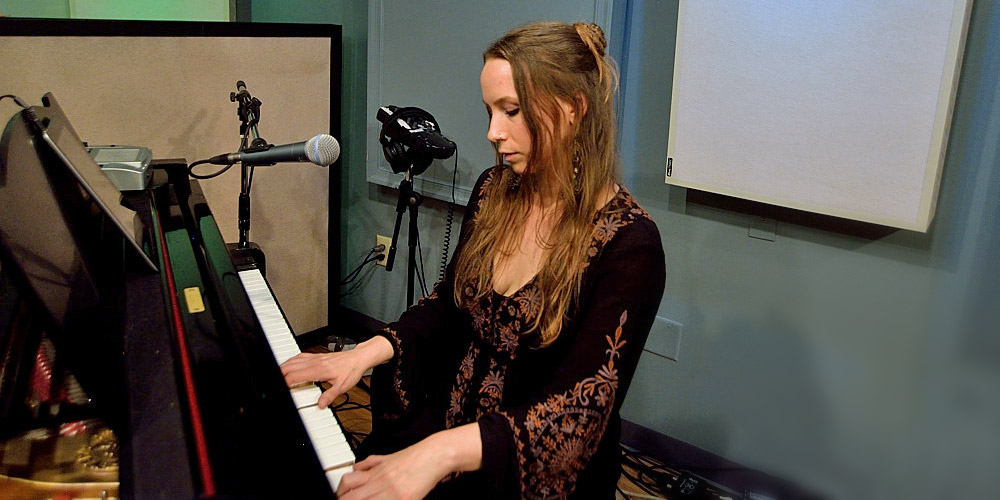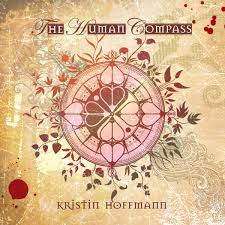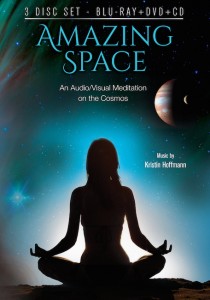Kristin Hoffman's Spiritual Space in Echoes Podcast
Podcast: Play in new window | Download
Subscribe: RSS
Hear Kristin Hoffmann’s interview above or download the podcast from iTunes.
 Kristin Hoffmann was supposed to be a classical singer, but something happened on the way to the opera house. She became a singer-songwriter, releasing critically acclaimed albums like The Human Compass in 2014. I cited one song from it, “Let Go,” as one of my top ten songs of the year. But she’s gone back to her classical roots in a spacey, new age kind of way with the soundtrack to a DVD called Amazing Space. Kristin Hoffmann came into our studio to play live a while back, and we talked about music, space, chakras and the spirit.
Kristin Hoffmann was supposed to be a classical singer, but something happened on the way to the opera house. She became a singer-songwriter, releasing critically acclaimed albums like The Human Compass in 2014. I cited one song from it, “Let Go,” as one of my top ten songs of the year. But she’s gone back to her classical roots in a spacey, new age kind of way with the soundtrack to a DVD called Amazing Space. Kristin Hoffmann came into our studio to play live a while back, and we talked about music, space, chakras and the spirit.
Hoffmann has been playing piano since she was four but in her teens, she switched to operatic singing, which she studied at Juilliard.
“I just loved opera,” proclaims Hoffman. “And I really did consider following that as my main path.”
But as you can tell from her several albums, including the The Human Compass, she didn’t go that way. Instead of singing operas written by other composers, Hoffmann started writing her own tunes, and they weren’t the kind you hear at The Met.
 “Once I discovered songwriting and once I discovered that there’s a whole other world as a creator, interacting with music and allowing music to be a vehicle for a deeper expression, suddenly I fell madly in love,” she says. “I really knew that that was going to be my vocational path. I put out a record during my senior year in high school. I had an-an amazing band and we recorded a full-length record called Spring Comes. And, you know, even to this day, I look back and I feel really proud about that record. It has a much more folk quality to it. I was very inspired by Joni Mitchell at the time and I still am. But I was listening to a lot of Joni Mitchell and you can definitely hear the influence in a lot of that music.”
“Once I discovered songwriting and once I discovered that there’s a whole other world as a creator, interacting with music and allowing music to be a vehicle for a deeper expression, suddenly I fell madly in love,” she says. “I really knew that that was going to be my vocational path. I put out a record during my senior year in high school. I had an-an amazing band and we recorded a full-length record called Spring Comes. And, you know, even to this day, I look back and I feel really proud about that record. It has a much more folk quality to it. I was very inspired by Joni Mitchell at the time and I still am. But I was listening to a lot of Joni Mitchell and you can definitely hear the influence in a lot of that music.”
Kristin Hoffmann is slender with brown eyes and long, flowing brown hair. Wearing a full-length black dress with elaborate embroidery and bell sleeves, she could be the picture of a 60s flowerchild. But born in 1978, she missed that era by a bit. But her parents didn’t.
“My parents were hippies,” she laughs. “Just look at their wedding picture and you can tell they were hippies.”
Hoffmann has evolved considerably as a singer-songwriter and in the process she had to lose some of her classical vocal technique.
“If you listen back to some recordings I did when I was in my very early 20s, you hear a lot more vibrato and whatnot in my regular singer-songwriter playing,” she observes. “It took me a while to really get in touch with all the different textures, and qualities, and the whisper of my voice in contrast to the full operatic belt, you know.”
There’s no denying the power in Kristin Hoffmann’s voice. She isn’t one of those ethereal girl singers and that makes her music so much more emotionally intense on her 2014 album, The Human Compass. It was written in a period emotional distress.
“Yes, The Human Compass, it came after a huge shift in my life,” she reflects. “ I had been in a very long relationship and that came to an end. And I was on my own for a while and it really was my time of tuning back into myself at a different part in my life as an individual, right, because when you’re in a long relationship, sometimes you start to identify as the couple and whatnot. So The Human Compass looks within to find the direction as opposed to a regular compass, which you look at the compass to find your direction to go out into the world–The Human Compass is kind of the reverse.” You can hear that in a song like “Let Go.”
If The Human Compass is an album born of sorrow and anguish, then Amazing Space is an album born of peace.
 “Amazing Space is about expanding open into a space of pure peace, bliss, getting to the higher parts of yourself, the higher resonance of humanity, of soul, right,” she blissfully declares.
“Amazing Space is about expanding open into a space of pure peace, bliss, getting to the higher parts of yourself, the higher resonance of humanity, of soul, right,” she blissfully declares.
Amazing Space is a DVD film that uses animated images from the Hubble Space Telescope. Hoffman scored the soundtrack and Ralph Stevens, a film archivist, came up with the concept.
“I had an experience when I was younger, when I was 19 years old, I was climbing in South America, where I saw the night sky at 21,000 feet, and it was literally the most mind-blowing experience of my life and I always wanted to recreate that,” Stevens says with unbridled awe. He found that sense of space in the images of the Hubble Space Telescope.
“What ties in everything, the music, the images, the whole idea of the transcendental experience is the vastness of space, just how huge it is,” he explains. “I mean, you’re looking at these nebulas that are these gorgeous, like, sculptures, and to think how huge they are.”
Kristin Hoffmann plugged directly into that feeling and took it to a different, even more spiritual place. She wasn’t just thinking of stars. In Hoffmann and Steven’s conception, this was an aid toward meditation and yoga. Hoffmann has studied sound healing and in 2008 recorded a meditation album called Sol Aum, Songs of Light. On Amazing Space, Hoffman says that a song like “Elixir” lines up with the sacral chakra in the pelvis.
“So I designed it to be the first track on Amazing Space, which is kind of like birthing its way into space, right,” she explains. “So in the body, the second chakra deals with birth, deals with opening to new experiences, opening to the deeper rooted new beginnings within yourself, and then within space, this was the part of the Amazing Space film, where we first start to go out to the stars. So I thought it was the perfect alignment that we’re birthing ourselves into the cosmos, literally and figuratively.”
Amazing Space is free of lyrics except for one song, Hoffmann’s adaptation of “Amazing Grace.” She turns the gospel hymn into a chant.
“Ralph and I were talking about space,” recalls Hoffman, “and I was thinking about the soundtrack, and suddenly it was one of those spontaneous ah-ha moments. Oh, let’s do a play on words and call this Amazing Space, and then for the theme song I’m going to do a little take on ‘Amazing Grace.’ But also I designed it so it could go nicely if somebody’s doing a yoga class, and at that point I thought it would be really wonderful to bring in the style of mantra singing, which is so important to the practice of yoga. And really that hones in on the meditation aspect as well.”
Amazing Space is in perfect alignment with the spiritual nature of Kristin Hoffman’s music. It’s a sensibility that goes all the way back to her first album.
“I feel that I’ve always been very tuned into spirit, very tuned into soul,” Hoffman remarks. “And if you listen to Spring Comes, I recently listened to it for the first time in a few years, and I was really reflecting like, wow, even when I was 17, I was deeply tuning into spiritual themes and human themes of suffering, and overcoming those parts of our being that are challenging, that bring us to places of light. This has always been the main theme for me.”
Kristin Hoffmann’s latest albums are The Human Compass and the DVD Amazing Space, which comes with a DVD, CD, and blu-ray disc.You can also stream Amazing Space here.
~John Diliberto
